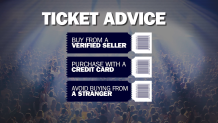She’s packing stadiums across the country and Chicago is one of her next stops: Taylor Swift is drawing thousands of fans to her “Eras Tour” every weekend she sings, and on June 2-4, Swift will be playing a sold-out show at Soldier Field, with Swifties uniting, hand-in-hand.
But there’s a hidden trap out there that fans could fall for, if they are not careful.
Chicago father James Imlach knows that trap too well, and he hopes his story will serve as a warning for others.
Imlach explained he was hoping to snag three tickets to the Eras Tour for his daughter and her two friends, as a gift for their upcoming high school graduation.
So last month, Imlach said he turned to the online platform OfferUp and started messaging with a seller who said he had three tickets for sale.
“It started out [with] text messaging back and forth,” Imlach explained. “That guy sent me a picture of himself.”
All was well, Imlach thought, until sent his money.
“I Zelle’d over the $660,” Imlach said. “And at first, he told me, ‘I'm having internet problems, I'm having problems charging my phone,’ but I kept my cool. And then he sent me one ticket out of the three that I ordered.”
Imlach said he compared that single ticket to an authentic one a friend had purchased, and at that point, he realized it was fake.
“I fell for it,” he said. “I was a sucker, I was gullible.”
Feeling out of the loop? We'll catch you up on the Chicago news you need to know. Sign up for the weekly> Chicago Catch-Up newsletter.
OfferUp is now investigating what happened and told NBC 5 Responds it has since blocked the account of the seller in that case.
Imlach said he tried to get his money back from Zelle, but no luck there, as the electronic transfer service is not like your typical bank when it comes to chargebacks.
“Zelle is not interested, and the banks that are behind it are not interested, in terms of helping people, especially if they’ve been defrauded,” Kevin Brasler of Consumers’ Checkbook told NBC 5 Responds in a previous report.
Zelle has explained it’s essentially just the messenger, communicating money transfers from one bank account to another, but never actually holding the funds meaning only banks can issue refunds in cases of fraud.
Imlach said he reached out to his bank, Huntington National Bank, but a representative told him it was unable to recover the funds.
A spokesperson for Huntington National Bank said it could not comment on Imlach’s individual case, in accordance with its privacy policies, but shared an important warning for all consumers.
“Zelle should only be used to send money to friends, family, and people you trust,” a spokesperson for Huntington Bank said. “Zelle should not be used for goods or services, and should not be used to send money to recipients with whom you are not familiar or do not trust.”
Imlach hopes Swift fans will listen to his story, and take it as a warning.
“Unfortunately, I trusted somebody – a complete stranger – and not only did I not get the tickets, but I never got my money back either,” Imlach explained. “He ghosted me.”
The Taylor Swift trap that Imlach fell for is one the Better Business Bureau is warning it is seeing a large number of consumers fall for in Chicago.
“I’ve been doing this for 36 years and this is probably the most times we’ve seen people ask for tickets and the most ads we’ve seen on the secondary market for tickets,” Steve Bernas of the BBB said. “So with that comes scammers.”
Safety Checklist for Purchasing Secondary Market or Resale Tickets
With the concert more than a week away, NBC 5 Responds and the Better Business Bureau has a safety checklist for anyone seeking tickets on the secondary market:
- Make sure you’re buying tickets from a verified seller. If it’s online, through a platform like OfferUp, know the company’s policies. For example, with OfferUp, the app recommends only paying for tickets electronically using its payment protection plan, versus using a wire transfer like Zelle. And if the seller says they will only accept Zelle, know that is a red flag.
- Use your credit card for purchases. It’s the payment method that often offers the best fraud protection but check with your bank, as sometimes there’s fine print there to know about.
- Look for resale tickets on your own social network. The BBB strongly advises against buying tickets from complete strangers, if you can avoid it.
- Be skeptical and verify secondary market tickets for authenticity. Crooks can forge barcodes and tickets, so make sure whatever you buy is authentic.
- Does it pass the smell test? If a price for a ticket looks too good to be true, it likely is not real. In the Taylor Swift example, resale tickets have been priced at over $1,000 each.

For more advice on finding Taylor Swift tickets, click here.



